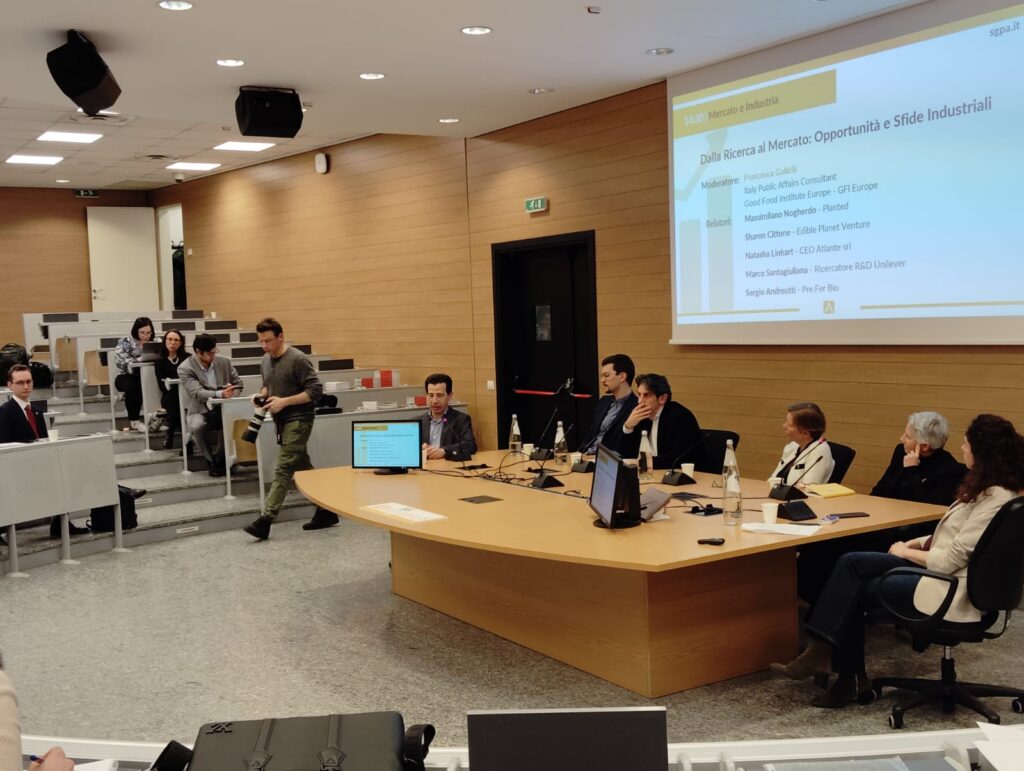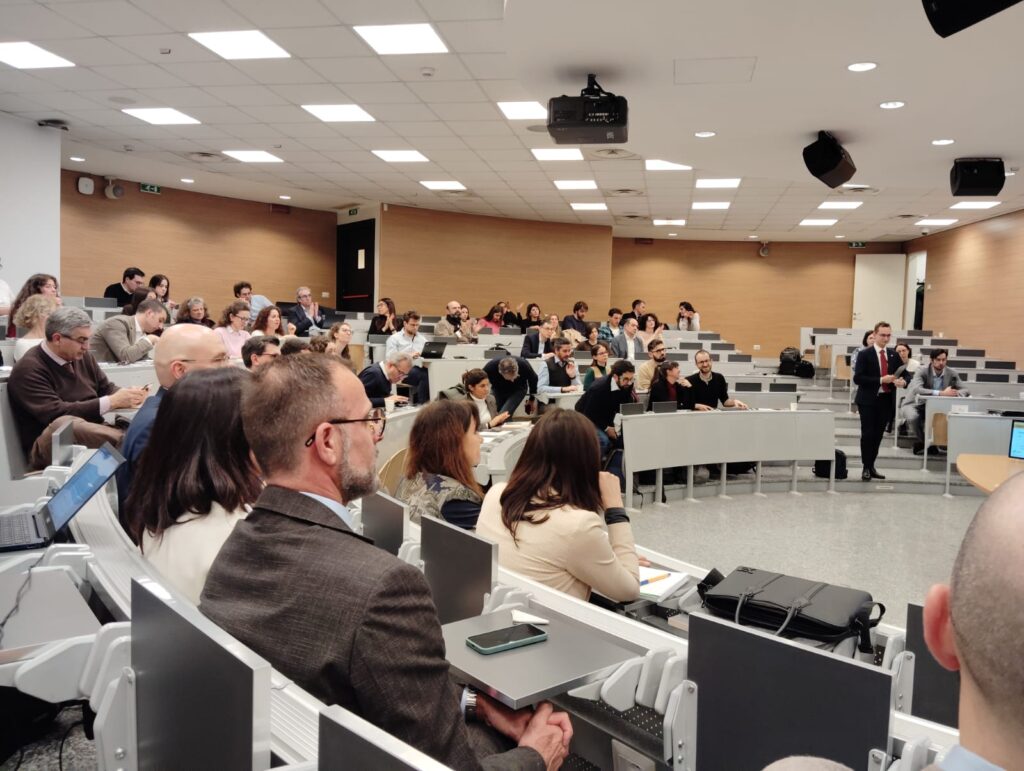Taste is key to a successful future for plant-based food in Italy
World-renowned for its fantastic cuisine, it’s no surprise Italian expertise has a lot to offer in the development of delicious plant-based foods. Here are some key insights from our Policy Manager for Italy Francesca Gallelli, following the recent ‘Alternative’ event in Milan.
Questo articolo è disponibile anche in italiano.

Several key themes connect the many companies that have entered the plant-based sector in recent years, whose retail market in Italy has grown by 16% in two years according to Circana data analysed by the Good Food Institute Europe.
How much does taste influence the success of plant-based meat and dairy? How can innovative solutions such as precision fermentation improve flavour, functionality and scalability? What role do governments play in supporting innovation in this sector? And what does the future hold, in light of an increasing number of health-conscious consumers?
These and many other questions were at the heart of the roundtable discussion “From Research to Market: Industrial Opportunities and Challenges,” moderated by GFI Europe as part of Alternative, an event organised in February by Italbiotec and Biotopics at the University of Milan-Bicocca. It was a valuable opportunity to explore the prospects and challenges of the plant-based sector, which, as Il Sole 24 Ore notes, continues to grow in Italy, largely driven by academic research. According to GFI Europe’s latest analysis, Italy leads Europe in the number of researchers working on alternative proteins.
From Startup Boom to the Challenge of Taste and Price Parity
Sharon Cittone, CEO and founder of Edible Planet Ventures, opened the debate by retracing the origins of what is considered the “new generation” of plant-based meat, which surged between 2015 and 2022. This wave was initially led by pioneering startups with a strong ethical and sustainable mission, which later attracted the attention of large corporations and venture capital. However, in 2022, the sector began to falter due to obstacles such as a lack of infrastructure to scale production, unfavourable interest rates, and regulatory challenges like plant-based labelling restrictions, especially in Europe. According to Sharon, part of the responsibility also lies within the industry itself, which often positioned itself in direct opposition to animal-based products – an approach that encouraged polarisation rather than dialogue.
Some companies, however, have learned from the mistakes of this initial phase and adopted more effective strategies. One such example is Planted, a startup founded in 2019 as a spin-off of ETH Zurich. Starting with a team of just four PhD students, the company now boasts 280 employees (including over 60 in R&D) and operates in seven countries. Massimiliano Nogheredo, Sales Manager for Italy, explains that Planted’s success was driven by its focus on a clean-label approach, prioritising taste while keeping sustainability as a key pillar. Their goal was to create a plant-based food ‘with the shortest ingredient list in the world,’ which they achieved with a four-ingredient recipe that quickly won over local restaurants and facilitated large-scale growth. “Several factors made the difference,” says Massimiliano, “a simple and clean label, the Swiss commitment to environmental sustainability, and pride in a locally produced food. But the key factor has always been taste.”

Marco Santagiuliana, R&D Manager and Lead Scientist at The Vegetarian Butcher, also highlights the importance of taste, alongside health and sustainability as fundamental drivers. However, the nutritional focus is gaining more prominence, with growing attention on fortification and micronutrients, in line with evolving consumer demand. In this regard, The Vegetarian Butcher has partnered with Every, a US company specialising in precision fermentation-made egg proteins to replace methylcellulose. “It’s a promising approach but not without challenges,” says Marco, “both due to regulatory barriers in some markets and because it is a new ingredient that consumers need to understand and accept – not to mention allergy-related limitations.”
Sergio Andreutti, Project Manager at Pre-Fer Bio, a consultancy specialising in biotechnological industrial processes, delves into precision fermentation, a solution that has found new applications in the food industry in recent decades, aiming to produce proteins efficiently while ensuring supply stability and cost-effectiveness. “For a startup, managing the entire process up to the final product is complex. The winning model today is that of companies producing proteins through fermentation and forming partnerships with larger firms to accelerate market entry,” explains Sergio. The biggest challenge? Achieving price parity. “Companies won’t pay more for an ingredient solely for ethical reasons or to serve a niche market. Some proteins, like leghemoglobin, lactoglobulins, ovalbumin, and lactoferrin, are nearing price parity. For dairy proteins, however, it will take more time.”
Natasha Linhart, CEO of Atlante Srl, one of Italy’s first import and distribution companies to believe in the potential of plant-based foods, brings in the retailer perspective. Natasha recounts how, over 30 years ago, she fought to bring plant-based milk to supermarkets, which at the time was sold only in pharmacies at prohibitive prices. “My son was allergic to cow milk, so I made price parity a mission, even launching campaigns to reduce VAT.” Looking at the present, Natasha reflects on current trends and consumer perception. “Many fear processed foods, but not all industrial processes are the same. Some ensure nutritionally sound labels, while others – like pre-fried products – are not ideal for health. Plant-based foods must break away from the ‘fast food model,’ offering versatile products that inspire creativity in the kitchen while preserving the emotional connection with food.”
The Way Forward: Innovation, Synergy, and Inclusivity
What does the future hold for plant-based foods? According to Sharon Cittone, the keywords are “synergy” between research and industry and “inclusivity” towards the agricultural sector, to refocus on those who have always been at the heart of food production. “Government support is crucial, both for farmers and to help companies scale production,” she emphasises.
Sergio Andreutti adds that fermentation also has a sustainability advantage, thanks to lower emissions and reduced land and water use while offering exciting opportunities for agriculture. “Microorganisms are not picky: they can be fed with agricultural by-products instead of sugars or raw materials produced from scratch, thus promoting the circular economy. Italy has exceptional strength in its production chain and, despite cultural resistance, could expand its offerings by diversifying through existing and repurposed production plants.”

Marco Santagiuliana highlights the importance of investing in research and development, not only to overcome challenges related to the texture of plant-based foods but also to explore new protein sources such as fava beans and pea proteins, reducing dependence on soy.
Looking ahead, the future of our food system must embrace diversification and innovation, with alternative proteins playing a key and complementary role in building more sustainable, secure, and accessible food systems. Achieving this requires collective effort and expertise – bringing together research, industry, institutions, and the agricultural sector. Dialogue and collaboration will be essential to turning the potential of these solutions into real impact, benefiting both society and the planet.

Francesca Gallelli
Policy Manager, Italy
Francesca is our Policy Manager leading GFI Europe’s public affairs work in Italy.
